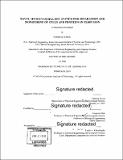| dc.contributor.advisor | Jongyoon Han. | en_US |
| dc.contributor.author | Kwon, Taehong. | en_US |
| dc.contributor.other | Massachusetts Institute of Technology. Department of Electrical Engineering and Computer Science. | en_US |
| dc.date.accessioned | 2019-07-17T20:57:43Z | |
| dc.date.available | 2019-07-17T20:57:43Z | |
| dc.date.copyright | 2019 | en_US |
| dc.date.issued | 2019 | en_US |
| dc.identifier.uri | https://hdl.handle.net/1721.1/121723 | |
| dc.description | Thesis: Ph. D., Massachusetts Institute of Technology, Department of Electrical Engineering and Computer Science, 2019 | en_US |
| dc.description | Cataloged from PDF version of thesis. | en_US |
| dc.description | Includes bibliographical references. | en_US |
| dc.description.abstract | High-quality complex biopharmaceutical products based on cells and proteins are transforming modem medicine and advancing treatments for many health conditions. Continuous biomanufacturing is one of the top technology trends in the biopharmaceutical industry to improve biological product quality and reduce manufacturing cost. This thesis introduces novel high-throughput microfluidic cell separation and nanofluidic protein quality monitoring technologies. The novel micro/nanofluidic system enables reliable and efficient microfiltration and robust online rapid product quality monitoring during continuous biomanufacturing. This technology overcomes the limitations of the current membrane-based microfiltration and quality monitoring technologies, including filter clogging, low product recovery, manual sample preparation, and off-line analysis. The first part describes the novel cell retention device for perfusion culture based on inertial sorting. | en_US |
| dc.description.abstract | Size-dependent hydrodynamic forces enabled membrane-less microfiltration for the separation of suspended mammalian cells. The device performance in terms of cell retention efficiency, long-term biocompatibility, and scalability was assessed. Long-term and small-scale perfusion culture using the device was subsequently demonstrated. Clog-free cell retention with high product recovery in this work can be utilized for long-term reliable and efficient perfusion culture. The next part describes the removal of small dead cells from bioreactor cultivation by high-throughput size-based cell separation using inertial sorting. The device parameters were studied to optimize removal of the dead cells, and high-throughput and high-concentration dead cell removal was demonstrated. Finally, continuous online purity monitoring of the proteins in the cell culture supernatant during perfusion culture was achieved with a novel nanofluidic filter array. | en_US |
| dc.description.abstract | This nanofluidic device with online sample preparation system was integrated with perfusion culture using the microfluidic cell retention device. The purity of proteins in the cell culture supernatant was monitored for more than a week in a fully automated continuous manner. As a robust online sensing technology for continuous biomanufacturing, this nanofluidic filter array could replace the existing offline analytical technologies for protein purity monitoring. In summary, this thesis presents a novel micro/nanofluidic system for separation and monitoring of cells and proteins for continuous biomanufacturing. This innovative approach can contribute to long-term reliable and efficient biomanufacturing in the future. | en_US |
| dc.description.statementofresponsibility | a dissertation presented by Taehong Kwon. | en_US |
| dc.format.extent | xv, 16-152 pages | en_US |
| dc.language.iso | eng | en_US |
| dc.publisher | Massachusetts Institute of Technology | en_US |
| dc.rights | MIT theses are protected by copyright. They may be viewed, downloaded, or printed from this source but further reproduction or distribution in any format is prohibited without written permission. | en_US |
| dc.rights.uri | http://dspace.mit.edu/handle/1721.1/7582 | en_US |
| dc.subject | Electrical Engineering and Computer Science. | en_US |
| dc.title | Novel micro/nanofluidic system for separation and monitoring of cells and proteins in perfusion | en_US |
| dc.type | Thesis | en_US |
| dc.description.degree | Ph. D. | en_US |
| dc.contributor.department | Massachusetts Institute of Technology. Department of Electrical Engineering and Computer Science | en_US |
| dc.identifier.oclc | 1102048508 | en_US |
| dc.description.collection | Ph.D. Massachusetts Institute of Technology, Department of Electrical Engineering and Computer Science | en_US |
| dspace.imported | 2019-07-17T20:57:39Z | en_US |
| mit.thesis.degree | Doctoral | en_US |
| mit.thesis.department | EECS | en_US |
